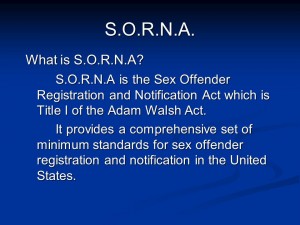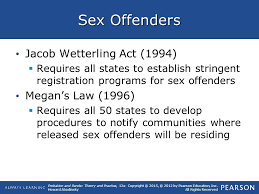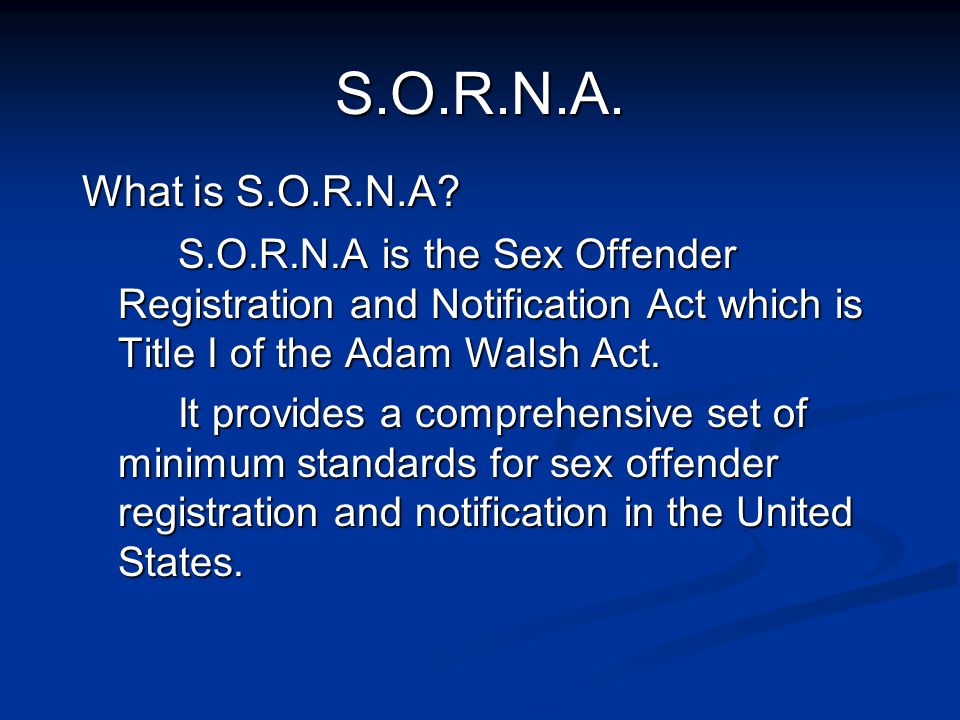Federal Sex Offender Registration And Notification Act: When The Sex Offender Moves Out Of The Country
Nichols v. United States
Slip Opinion No. 12-5238
United States Supreme Court
Decided on: April 4, 2016
Issue: Whether the Sex Offender Registration and Notification Act (SORNA) requires a defendant to register in Kansas, where he formerly resided, when he now resides outside the United States.
Holding: No. The Sexual Offender Registration and Notification Act (SORNA) did not require Nichols to update his registration in Kansas once he departed the State.
SORNAS plain text dictates this holding. Critical here is 16193(a)s use of the present tense. Nichols once resided in Kansas, but after moving, he resides in the Philippines. It follows that once Nichols moved, he was no longer required to appear in Kansas because it was no longer a jurisdiction involved. Nor was he required to appear in the Philippines, which is not a SORNA jurisdiction, 16911(10). Section 16913(c)s requirements point to the same conclusion: Nichols could not have appeared in Kansas after leaving the State. SORNAs drafters could have required sex offenders to deregister in their departure jurisdiction before leaving the country had that been their intent.
The Sex Offender Registration and Notification act (SORNA) makes it a federal crime for certain sex offenders to knowingly fail to register or update a registration, 18 U.S.C. 2250(a)(3), and requires that offenders who move to a different State shall, not later than 3 business days after each change of name, residence, employment, or student status, inform in person at least 1 jurisdiction involved pursuant to 42 U.S.C. 16913(a) of all changes to required information, 16913(c). A 16913(a) jurisdiction is each jurisdiction where the offender resides is an employee, and is a student.
Facts: Lester Ray Nichols, a registered sex offender living in the Kansas City area, moved to the Philippines without notifying Kansas authorities of his change in residence. Nichols was convicted of failing to update his sex-offender registration, in violation of 18 U.S.C. 2250(a). The United States Supreme Court held that they must decide whether federal law required Nichols to update his registration in Kansas to reflect his departure from the State.
In 2003, Nichols was convicted of traveling with intent to engage in illicit sexual conduct with a minor in violation of 18 U.S.C. 2423(b). Although his defense predated SORNAs enactment, Nichols was nevertheless required upon his eventual release in December 2011 to register as a sex offender in Kansas, where he chose to settle, 28 CFR 72.3 (2015). He complied with SORNAs registration requirements until November 9, 2012, when he abruptly disconnected all of his telephone lines, deposited apartment keys in his landlords drop box, and boarded a flight to Manila.
When Nichols was a no-show at mandatory sex-offender treatment, a warrant was issued revoking his supervised release. Nichols was arrested in December 2012 and charged with one count of knowingly failing to register or update a registration as required by SORNA, 18 U.S.C 2250(a)(3). He unsuccessfully moving to dismiss the indictment on the ground that SORNA did not require him to update his registration in Kansas, Nichols conditionally pleaded guilty and reserved his right to appeal. The Tenth Circuit affirmed, holding that when a sex-offender leaves a residence in a state, and then leaves the state entirely, that state remains a jurisdiction involved under 16913. 775 F.3d, at 1229.

The United States Supreme Court granted certiorari where they note that Nichols was required to appear in person in at least 1 jurisdiction involved pursuant to subsection (a) and inform the jurisdiction of his change of residence, 42 U.S.C. 16913 (c).
However, subsection (a) mentions three possible jurisdictions: where the offender resides, where the offender is an employee, and where the offender is a student, 16913(a). The Philippines is not a jurisdiction under SORNA; no foreign country is, 16911(10). Putting these provisions together, SORNA therefore requires a sex offender who changes his residence to appear, within three business days of the change in person in at least one jurisdiction (but not a foreign country) where he resides, works, or studies, and to inform that jurisdiction of the address change.
Critically, here, 16913(a) uses only the present tense: resides, is an employee, is a student. A person who moves from Leavenworth to Manila no longer resides (present tense) in Kansas; although he once resided in Kansas, after his move he resides in the Philippines. Once Nichols moved to Manila, he was no longer required to appear in person in Kansas to update his registration, for Kansas was no longer a jurisdiction involved pursuant to subsection (a) 16913. The requirement in 16913(c) to appear in person and register no more than 3 business days after each change of residence, points to the same conclusion. Nichols could not have appeared in person in Kansas after leaving the State. If the drafters of SORNA had thought about the problem of sex offenders who leave the country and had sought to require them to deregister in the departure jurisdiction, they could have easily said so; indeed, that is exactly what the amended Wetterling Act had required, 42 U.S.C. 14071(b)(5). The United States Supreme Court reversed the order of the Court of Appeals for the Tenth Circuit.
Legal Analysis: The United States Supreme Court held that they must decide whether a federal law required Nichols to update his registration in Kansas to reflect his departure from the State.
Following the high-profile and horrific rape and murder of a 7-year old Megan Kanka by her neighbor, States in the early 1990s began enacting registry and community notification laws to monitor the whereabouts of individuals previously convicted of sex crimes, Smith v Doe, 538 U.S. 84,89 (2003); Filler, Making the Case for Megans Law, 76 Ind. L. J. 315-317 (2001). Congress followed suit in 1994 with the Jacob Wetterling Crimes Against Children and Sexually Violent Offender Registration Act, 108 Stat. 2038, 42 U.S.C. 14071 et seq. (1994 ed.). Named after an 11-year old who was kidnapped at gunpoint in 1989, the Wetterling Act conditioned the federal funds on States enacting sex-offender registry laws meeting certain minimum standards, Smith, 538 U.S., at 89-90. By 1996, every State, the District of Columbia, and the Federal Government had enacted some variation of a sex-offender registry. Id., at 90.
In 2006, Congress replaced the Wetterling Act with the Sex Offender Registration and Notification Act (SORNA). 120 Stat. 590, 42 U.S.C. 16901 et seq. Two changes are pertinent here,
First: Congress made it a federal crime for a sex offender who meets certain requirements to knowingly fail to register or update a registration as required by SORNA, 18 U.S.C. 2250(a)(3); see Carr v United States, 560 U.S. 438, 441-442 (2010) Second: Congress amended the provisions governing the registration requirements when an offender moves to a different State.
The original Wetterling Act had directed States to require a sex offender to register the new address with a designated law enforcement agency in another State to which the person moves not later than 10 days after such person establishes residence in the new State?if the new State has a registration requirement, 42 U.S.C. 14071(b)(5) (1994 ed.) Congress later amended this provision to direct States to require a sex offender to report the change of address to the responsible agency in the State the person is leaving, and to comply with any registration requirement in the new State of residence, 42 U.S.C 14071(b)(5) (2000 ed).
SORNA repealed this provision of the Wetterling Act. 120 Stat. 600. In its place, federal law now provides: a sex offender shall, not later than 3 business days after each change of name, residence, employment, or student status, appear in person in at least 1 jurisdiction involved pursuant to subsection (a) and inform that jurisdiction of all changes in the information required for that offender in the sex offender registry, 42 U.S.C. 16913(c). Subsection (a) provides: a sex offender shall register, and keep the registration current, in each jurisdiction where the offender resides, where the offender is an employee, and where the offender is a student, 16913(b)(1)-(7). The question presented in this case is whether the State a sex offender leaves?that is, the State where he formerly resided?qualifies as an involved jurisdiction under 16913.
The Government argues that once an offender registers in a jurisdiction, that jurisdiction necessarily remains involved pursuant to subsection (a) because the offender continues to appear on its registry as a current resident, brief for the United States 24. But 16913(a) lists only three possibilities for an involved jurisdiction: where the offender resides, where the offender is an employee and where the offender is a student. Notably absent is where the offender appears on a registry. The Supreme Court held that they decline the Governments invitation to add an extra clause to the text of 16913(a).
The United States Supreme Court held that long ago they remarked in another context, what the government asks is not a construction of a statute, but in effect, an enlargement of it by the court, so that what was omitted, presumably by inadvertence, may be included within its scope. To supply omissions transcends the judicial function, Iselin v United States, 270 U.S 245, 251 (1926).
The Government points out that among the pieces of information a sex offender must provide as part of his registration, is the address of each residence at which the sex offender resides or will reside, 16914(a)(3). The use of the future tense, says the Government, shows that SORNA contemplates the possibility of an offenders updating his registration before actually moving. But, 16914(a) merely lists the pieces of information that a sex offender must provide if and when he updates his registration; it says nothing about whether the offender has an obligation to update his registration in the first place.
The United States Supreme Court held that they interpret criminal statutes, like other statutes in a manner consistent with ordinary English usage, Abramski v United States, 573 U.S. ____-___(2014); Flores-Figueroa v United States, 556 U.S. 646, 652 (2009).
The United States Supreme Court held that they are mindful that SORNAs purpose was to make more uniform what had remained a patchwork of federal and 50 individual state registration systems, with loop-holes and deficiencies that had resulted in an estimated 100,000 sex offenders becoming missing or lost, United States v Kebodeaux, 570 U.S. ___,___-___(2013) (slip op., at 11-12). Yet, even the most formidable argument concerning the statute’s purpose could not overcome the clarity they find in the statutes text, Kloeckner v Solis, 568 U.S. ___,____,n.4 (2012) (slip op., at 14, n. 4).
 The United States Supreme Court held that their interpretation of the SORNA provisions at issue in this case in no way means that sex offenders will be able to escape punishment for leaving the United States without notifying the jurisdictions in which they lived while in this country. Congress has recently criminalized the knowing failure to provide information required by SORNA relating to intended travel in foreign commerce.
The United States Supreme Court held that their interpretation of the SORNA provisions at issue in this case in no way means that sex offenders will be able to escape punishment for leaving the United States without notifying the jurisdictions in which they lived while in this country. Congress has recently criminalized the knowing failure to provide information required by SORNA relating to intended travel in foreign commerce.
International Megans Law to Prevent Child Exploitation and Other Sexual Crimes Through Advanced Notification of Traveling Sex Offenders, Pub. L. 114-119, 6(b)(2), 130 Stat. 23, to be codified at 18 U.S.C. 2250(b). Such information includes: anticipated dates and places of departure, arrival, or return; carrier and flight numbers for air travel; destination country and address or other contact information therein, et cetera. 6(a)(1)(B), 130 Stat. 22, to be codified at 42 U.S.C. 16914(a)(7). Both parties agree that the new law captures Nichols’s conduct. Supp. Brief for United States 3; Reply Brief 10; Tr. of Oral Arg. 18, 35. And, of course, Nichols’s failure to update his registration in Kansas violated state law. Kan. Stat. Ann. 22-4905(g). The United States Supreme Court are thus reassured that their holding today is not likely to create loopholes and deficiencies in SORNAs nationwide sex-offender registration scheme. The Judgment of?the Court of Appeals for the Tenth Circuit should be reversed.
